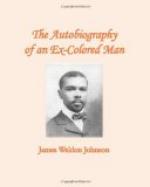influence of the same evils in London. I have
walked along the terrace cafes of Paris and seen hundreds
of men and women sipping their wine and beer, without
observing a sign of drunkenness. As they drank,
they chatted and laughed and watched the passing crowds;
the drinking seemed to be a secondary thing.
This I have witnessed, not only in the cafes along
the Grands Boulevards, but in the out-of-the-way places
patronized by the working classes. In London
I have seen in the “pubs” men and women
crowded in stuffy little compartments, drinking seemingly
only for the pleasure of swallowing as much as they
could hold. I have seen there women from eighteen
to eighty, some in tatters, and some clutching babes
in their arms, drinking the heavy English ales and
whiskies served to them by women. In the whole
scene, not one ray of brightness, not one flash of
gaiety, only maudlin joviality or grim despair.
And I have thought, if some men and women will drink—and
it is certain that some will—is it not
better that they do so under the open sky, in the
fresh air, than huddled together in some close, smoky
room? There is a sort of frankness about the evils
of Paris which robs them of much of the seductiveness
of things forbidden, and with that frankness goes
a certain cleanliness of thought belonging to things
not hidden. London will do whatever Paris does,
provided exterior morals are not shocked. As
a result, Paris has the appearance only of being the
more immoral city. The difference may be summed
up in this: Paris practices its sins as lightly
as it does its religion, while London practices both
very seriously.
I should not neglect to mention what impressed me
most forcibly during my stay in London. It was
not St. Paul’s nor the British Museum nor Westminster
Abbey. It was nothing more or less than the simple
phrase “Thank you,” or sometimes more
elaborated, “Thank you very kindly, sir.”
I was continually surprised by the varied uses to which
it was put; and, strange to say, its use as an expression
of politeness seemed more limited than any other.
One night I was in a cheap music hall and accidentally
bumped into a waiter who was carrying a tray-load
of beer, almost bringing him to several shillings’
worth of grief. To my amazement he righted himself
and said: “Thank ye, sir,” and left
me wondering whether he meant that he thanked me for
not completely spilling his beer, or that he would
thank me for keeping out of his way.
I also found cause to wonder upon what ground the
English accuse Americans of corrupting the language
by introducing slang words. I think I heard more
and more different kinds of slang during my few weeks’
stay in London than in my whole “tenderloin”
life in New York. But I suppose the English feel
that the language is theirs, and that they may do
with it as they please without at the same time allowing
that privilege to others.




